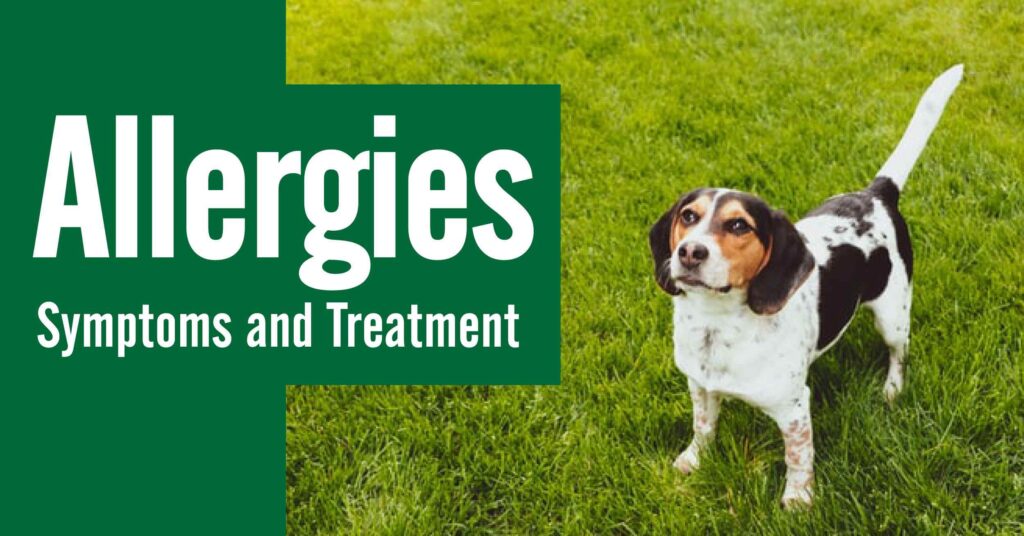Manage Dog Allergies: Symptoms, Types, Home Remedies, & Treatment
How to manage Dog Allergies
Table of Contents
Dogs are prone to allergies just like human beings, although many factors contribute to causing allergies, mainly, they happen when a dog or any other animal is exposed to some allergen time after time and their immune system reacts to it in the form of an allergy. Most allergies occur after the age of 6/7 months in dogs.

What are Dog Allergies?
Allergy is a reaction of the body that occurs in different forms caused by an allergen. Typically, the immune system works as a defence mechanism for diseases and viruses, but in the case of allergies, the immune system works oppositely and harms the body itself in allergies. There are different forms of allergies in dogs but most of them appear in the shape of skin irritation.
In dogs, cells called ‘mast’ are found in different tissues in their entire body. So when a dog is exposed to an allergen, it combines with the antibodies in the blood and attached to the mast cells. When antibodies, allergen and mast cells react with one another, chemicals are released in the body causing an allergy.
Allergies in dogs are, unfortunately more common than you think. Many dogs experience allergies at some point in their lives. While we know that dogs cannot take care of themselves and do not understand what is good for their health and whatnot, but you, as an owner, can and should.
You need to understand that a dog has a fully functioning system inside its body that will react if outside agents enter and disturb its functioning.
Most dog despite their breed, can develop seasonal or other allergies, et, certain breeds appear to be more predisposed towards negative reactions, including:
- Pugs
- Bulldogs
- Terriers
- Golden Retrievers

Types of Allergies in Dogs;
Some allergies are present in the genes due to heredity (passing on from the parent). This includes allergies like allergy to pollen and plants.
Other allergies occur due to exposure as listed below:
Flea Allergy:
When a flea or any other insect stings a dog, an inflammatory reaction can be caused. Sensitive dogs with weak immune systems can have an allergy caused by the bite of insects like mosquitoes, fleas, ants, bees, spiders, ticks etc. As a reaction, skin irritation is caused, leading to hair loss of the area, which creates the possibility for further infections in the hairless region.
It is important to create a flea-free space and environment for your dog to keep them away from any sort of contact with fleas. Furthermore, your veteran can guide you to get rid of fleas.
Food Allergy:
Food allergies can be caused in reaction to different sorts of food that your dog be intolerant to, i.e. soy, beef, chicken etc. Food allergies in dogs can cause digestive disorders and affect their appetite.
Inhalant Allergy:
Inhalant allergies in dogs are caused due to inhalant allergens (which can be inhaled through breathing) like tree, grass and weed pollens. Inhalant allergies mostly occur seasonally, just like humans can have seasonal allergies. Dogs experience itchy skin in reaction to these allergies.
Environmental Allergy:
These allergies are caused by allergens present in the environment like dust, pesticides etc.
Dog Allergy Symptoms:
In different cases of allergies, dogs show different sorts of symptoms but most of them include:
- Skin irritation of itchiness as a reaction. Your dog may itch their skin more than usual and try to scratch it.
- Vomiting can also take place as an allergic reaction mostly due to food allergies.
- Your dog may begin to lick their skin more than usual because of discomfort and itchiness.
- Red skin is a major symptom of allergies in dogs.
- Ear infections and runny eyes.
- Hives
- Diarrhea
Diagnosis of Allergies in Dogs:
Mostly, allergies can be identified by the symptoms that appear but if the symptoms are confusing and complicating, then allergy testing is done to find out what allergen is present in the body of the dog.
It is observed that many allergies develop in the second year of life for dogs because this is when the dog’s immune system is most active and will overreact to the antigens causing the release of immune cells, which further release inflammatory substances and cause itching. It is also rare that a dog may be allergic to just one substance.
Many dogs are born with sensitive skin barriers which easily allow allergens to enter and react. It is true that these dogs also may have a weak immune system that further complicates the condition. Allergies in dogs can be really complicated and very hard to identify. Sometimes, a dog may be suffering from different allergies at one point, and treatment becomes difficult because one drug may help cure one allergy but trigger another at the same time.
Treatment of Allergies in Dogs:
It highly depends on the diagnoses how early and how improving the treatment turns out to be for your dog’s allergy. As soon as the allergen is diagnosed, it can be avoided too. For example, if your dog has a food allergy, it can be avoided, and the veteran may suggest an alternative fulfilling diet.
Other than precautions, there are allergy relief medications too that may be prescribed in case of no changes being seen as a result of lifestyle changes.
Benadryl is prescribed in most cases of dog allergies, it works for many cases like food allergies and seasonal allergies. Be aware that no medication must be given without the guidance and prescription of a veterinarian.
Listed below are some of the treatments for allergies in dogs:
Hypersensitive therapy:
Once the allergy is identified, allergy shots may be given to the dog which will be in the form of injectables and show quick improvements.
Shampoo therapy:
Your veteran may prescribe some medicated shampoos to treat skin allergies, itchiness, redness and inflammation. Bathing with those medicated shampoos helps remove the dead skin and kill bacteria.
Immunotherapy/treatment:
In immunotherapy, medication is provided to improve your dog’s immune system and help slow down to prevent itchiness.
Anti-inflammatory:
Anti-allergy drugs are another option to stop the allergic reaction immediately.
Dietary:
In case of food allergies, food supplements and a diet may help maintain the nutrition and prevent the allergy at the same time. Some dogs are allergic to protein which is also an essential part of their diet, in this case, supplements work as a treatment.
There isn’t any reliable test for diagnosing food allergies, blood tests that claim to detect food allergies have not been proven to consistently predict real allergies. A food trial is the only method that works to identify food allergies. Food trial treatment includes a limited ingredient diet which is presented in very small portions and bites.
It usually takes some weeks for food trials to reveal food allergies as it is only observational confidently. Along with a food trial, your vet also may prescribe some drugs.
In case the first food trial does not indicate anything, another food trial may be performed with a diet based on a different ingredient. This method will take long and does not work for dogs who have a severe case of allergies.
Anti-itch therapy:
Drugs are provided to stop the cause that triggers itchiness in the body. A veterinarian should only prescribe the amount and kind of drugs.
Immunotherapy:
In this method, attempts the dogs’ tolerance level is targeted to be improved towards allergens. Most of the veterans suggest this therapy for dog allergies. This treatment works by checking the test results with the possible allergens during that time of year when the dog has shown symptoms. Allergy shots or drops may be prescribed in this therapy. This is followed by a series of shots that the veterinarian will initially do, but your veteran may train you for giving the shots yourself for later shots. The doctor will highly administer this if you are eligible to do that.
The Truth of Allergy Testing:
The option of allergy testing is the most effective way in identifying the underlying cause of allergies in your dogs. It is fact-based and leads directly to the root of the allergen that has caused the allergy.
At the same time. It is also true that allergy testing cannot be used to determine whether a dog has atopic dermatitis or not. This can only be diagnosed based on history, clinical signs, and the exclusion of other skin diseases. While it is the most convenient and efficient, allergy testing is only beneficial in seeking the underlying cause, to prepare and begin the treatment. In dogs, allergy testing can be performed in two ways; skin testing or blood testing.
How can an owner manage their dog’s allergies?
To manage possible allergies in your dog’s body is to prevent them. Firstly, it is very important to understand your breed of dog, what kind of food and environmental conditions are best for them. This will help you create a safe environment for your pet and a healthy lifestyle. Once you understand your dog, their body type and needs, you may create the best possible diet for them which will prevent all sorts of food allergies.
Then, it is necessarily important to provide your pet dog with a clean and hygienic space that must be flea-free. A safe environment is the basic need of your pet. Bathing your pets regularly is very important.

Can you use natural remedies to remove dog allergens and prevent allergies?
Well, the answer is yes! There is a wide range of homemade remedies that you can use to remove allergens from home and create a safe environment for your pet dog. We know that dust, mites and other environmental allergens are a common cause of allergies in dogs. It is observed that regularly washing bedding in hot water helps remove these allergens from your house. Mopping the flood and keeping all the surfaces and furniture clean plays the same role.
Dogs and other pets often spend a lot of time resting on their favourite furniture spots, it is highly important to regularly clean those areas and use a non-toxic cleaning agent which is not harsh.
Also, as it should be, bathing your dog regularly (once or twice a week) can keep their hair and skin free from allergens but do not overdo this because it can instead leave the skin feeling dry and cause itching. Remember that your dog may be intolerant to the agents used in the substances like shampoo, so it is very important to consult a veterinarian first and know what type of cleaning agents work for your dog’s breed.
Can allergies be life-threatening?
Dogs’ allergies are mostly mild and are not deadly but, in severe cases where the reaction is very harsh and is kept untreated, death can occur.
Conclusion
If you see any sort of redness, inflammation or pattern on your dog’s skin or any other changed/abnormal behaviour, get them examined by a veteran to make sure no serious infections are caused.
Any sort of treatment takes a long-term commitment and consistency. No therapy will show results immediately, even if it does, it will not last long if the follow-up care and medication are not consistent. If you want your dog to be healthy, you need to follow instructions accurately and give it the time it requires. Do not panic as some treatment can initially increase symptoms. Your veterinarian will explain this and it is expected that the improvement may not be visible for some time after the treatment. It is a gradual process and needs patience. It is important that you stay in contact with your veterinarian and do not assume or give any medication on your own or on the suggestion of any friend whose dog had the same case. All dogs must have different body types and conditions which need to be treated accordingly. Even if your friend has the same breed of dog, even then the treatment and condition may be different.


